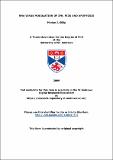RNA virus modulation of IFN, PI3K and apoptosis
Abstract
Interferon (IFN) and phosphatidylinositol 3-kinase (PI3K) are apoptosis regulators
that are targeted by viruses to promote survival of infected cells. Significant crosstalk
exists between IFN and PI3K, and this study sought to investigate the relationships
between IFN, PI3K and apoptosis during virus infection. Parainfluenza virus 5 (PIV5)
and influenza A virus (IAV) are both negative-sense single-stranded RNA viruses
that encode multifunctional proteins in order to maximise their genome coding
capacity. The PIV5 V and IAV NS1 proteins are well-studied as IFN antagonists and,
in addition, both are reported to modulate PI3K signalling. Less well-studied is the
role of these proteins in apoptosis regulation; the ability of V and NS1 to inhibit
apoptosis was therefore investigated. PIV5/V was found to limit cell death in
response to a number of apoptosis inducers in a manner that required its STAT1-
degradative activity and also inhibited activation of the PI3K downstream target, Akt.
IAV/NS1 binds directly to PI3K to stimulate its activity, and this is reported to mediate
anti-apoptotic signalling during IAV infection. However, a virus expressing an NS1
unable to bind PI3K did not induce more apoptosis than wt virus. NS1 expression,
either in a stable cell-line or during virus infection, was also unable to protect cells
from pro-apoptotic stimuli. NS1-mediated PI3K activation similarly had no effect on
IFN production or ISG expression in infected cells. In contrast, other NS1 mutant
viruses induced large amounts of apoptosis. These viruses also induced significant
levels of IFN and were unable to cause apoptosis in IFN-deficient cells, indicating
that NS1 limits apoptosis induction through its IFN antagonist functions. The
implications of this work for anti-cancer and anti-viral therapies are discussed.
Type
Thesis, PhD Doctor of Philosophy
Collections
Items in the St Andrews Research Repository are protected by copyright, with all rights reserved, unless otherwise indicated.

